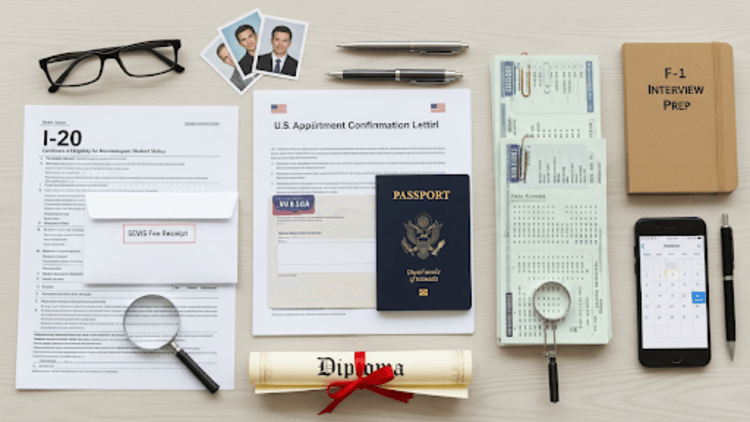
Getting ready for your f1 visa renewal can feel stressful, especially if it’s your first time or you’re doing it from outside the U.S. The key to a smooth interview? Being fully prepared with the right paperwork. One missing document can lead to delays, extra questions, or even a denial. So don’t wing it. Knowing exactly what to bring for f1 visa renewal helps you walk into that embassy or consulate feeling calm and confident. And remember, this is about proving you’re a real student who plans to return home after your studies — not just getting answers right.
Double-Check Your Basics
Before anything else, make sure you have the core items every applicant needs.
These are non-negotiable:
- Valid passport – must be good for at least six months beyond your stay
- DS-160 confirmation page – the form you filled out online
- Visa appointment letter – your official interview confirmation
- Receipts for fees paid – like the MRV application fee
No matter how strong your case is, you won’t get in without these.
Keep Your School Paperwork Ready
Your connection to school is the heart of your f1 visa renewal process. You need proof you’re still enrolled and in good standing.
Bring:
- Current I-20 form – signed by your DSO (Designated School Official) within the last year
- Transcripts or grade report – shows you’re actively studying
- Tuition payment receipt – proves you can afford your education
- Letter from school (optional but helpful) – confirms your enrollment status
If you’ve changed programs or schools, make sure your I-20 reflects that.
Show Proof of Ties to Your Home Country
The officer wants to know you’ll go back after graduation. They need to see you have reasons to return.
Help your case with documents like:
- Family ties – birth certificates, photos, letters
- Property ownership papers
- Job offer or contract waiting for you after school
- Bank statements showing funds back home
It doesn’t have to be fancy. Just something real that shows your life isn’t all in the U.S.
Be Ready With Financial Proof
You must prove you have enough money to cover tuition and living costs.
This includes:
- Recent bank statements (yours or sponsor’s)
- Sponsor’s letter (if someone else is paying)
- Scholarship award letters
- Loan approval documents
If a parent or relative is sponsoring you, include their ID and proof of income too.
Keep everything clear and translated if it’s not in English.
Don’t Forget These Helpful Extras
Some things aren’t always required, but they can help answer questions fast.
Consider bringing:
- Previous visas and entry/exit stamps
- Old I-20s from past semesters
- SEVIS fee payment receipt (I-901)
- Resume or academic achievements
- OPT or STEM OPT EAD card (if applicable)
For those on OPT, having your job letter and supervisor contact info handy makes a difference.
Know What Happens Next
After the interview, most people either get approved, denied, or hit with “administrative processing” (also called 221g).
If that happens:
- It’s not a denial – just a delay
- They might ask for more documents
- Processing can take days or weeks
- Don’t panic. Answer what they ask, and be patient.
Also, never book a non-refundable flight until your visa is stamped.
Bottom Line
Going through the f1 visa renewal process doesn’t have to be scary — as long as you’re ready. Having every document in order shows you’re serious, organized, and following the rules. While some think you can renew easily because they’ve had a visa before, there’s no guarantee. Each case is reviewed fresh. So treat it like your first time. Pack everything neatly, arrive early, dress professionally, and answer honestly.
Whether you’re renewing in your home country or a third location, being fully prepared is your best chance for a quick approval. And once you have that new visa stamp, you’re set to keep focusing on your future – one class at a time.
For more information visit us : flowactivo.org